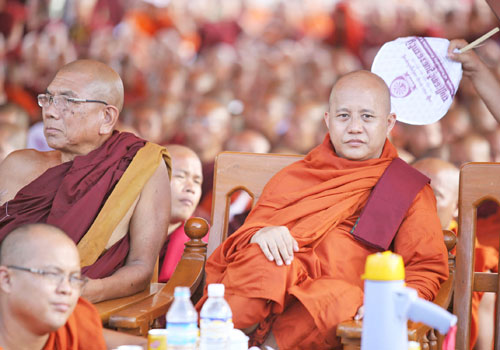‘Race and Religion’ Law Revellers Hit Mandalay in Burma/Myanmar
ASIA--PACIFIC, 28 Sep 2015
22 Sep 2015 – Influential nationalist group Ma Ba Tha celebrated in Mandalay Region yesterday, with tens of thousands of monks and laypeople convening to celebrate the passage of its controversial package of so-called Protection of Race and Religion laws.

Ashin Wirathu (right) watches events celebrating the passage of the race and religion laws in Mandalay yesterday. Photo: Si Thu Lwin / The Myanmar Times
The festivities were headed by Masoeyein monastery’s U Wirathu, a prominent figure in Ma Ba Tha’s central committee.
A march was held from Kyauk Myet Zay football stadium in Maha Aung Myay township to the football stadium in front of Phayargyi. People from other sub-townships in Mandalay celebrated by dancing and blaring music, while others rang in the occasion in traditional dress.
“Monks and people in Myanmar were able to enact the law by signing [a petition] and protesting. The law is good for not only Buddhist women but also for non-Buddhist women,” said Ma Ba Tha secretary Bhaddanta Indacaka Bhivamsa. “I’d like all of you to read the law carefully,” he said.
The four “race and religion protection” laws include the Population Control law, which was signed off on by President U Thein Sein on May 20. The Religious Conversion Law was greenlighted in the upper house on August 27, with the Interfaith Marriage Law and the Monogamy Law also enshrined in August.
“The laws are not breaching human rights – they are respecting human rights. They are not insulting other faiths, and it will only protect Buddhism and Buddhist people,” said Ma Ba Tha associate legal secretary of legal support committee U Zaw Naing.
“People said on Facebook that [the laws entail] seven years’ imprisonment and 10 years’ imprisonment – [these are] people who have not read the law in detail. There is no loss of human rights. The law said ‘not more than seven years of imprisonment and not more than ten years’ imprisonment.’ So, the case might be settled for one-day imprisonment, if the judge is of a good nature,” he continued.
The package of laws has drawn widespread condemnation from civil society and international rights groups, with Human Rights Watch saying the legislation represents “a wholly unjustified state interference in the right to freedom of conscience and religion”, and could be used to unfairly target the country’s Muslim minority.
A 37-year-old Muslim man from Ayeyarwady Region last week became the first to be charged for a breach of the monogamy law.
The legislation was submitted to parliament for consideration following a major petition drive from Ma Ba Tha, who claim they collected upward of 1 million signatures from people across the country.
_______________________________
Translation by Thiri Min Htun
DISCLAIMER: The statements, views and opinions expressed in pieces republished here are solely those of the authors and do not necessarily represent those of TMS. In accordance with title 17 U.S.C. section 107, this material is distributed without profit to those who have expressed a prior interest in receiving the included information for research and educational purposes. TMS has no affiliation whatsoever with the originator of this article nor is TMS endorsed or sponsored by the originator. “GO TO ORIGINAL” links are provided as a convenience to our readers and allow for verification of authenticity. However, as originating pages are often updated by their originating host sites, the versions posted may not match the versions our readers view when clicking the “GO TO ORIGINAL” links. This site contains copyrighted material the use of which has not always been specifically authorized by the copyright owner. We are making such material available in our efforts to advance understanding of environmental, political, human rights, economic, democracy, scientific, and social justice issues, etc. We believe this constitutes a ‘fair use’ of any such copyrighted material as provided for in section 107 of the US Copyright Law. In accordance with Title 17 U.S.C. Section 107, the material on this site is distributed without profit to those who have expressed a prior interest in receiving the included information for research and educational purposes. For more information go to: http://www.law.cornell.edu/uscode/17/107.shtml. If you wish to use copyrighted material from this site for purposes of your own that go beyond ‘fair use’, you must obtain permission from the copyright owner.